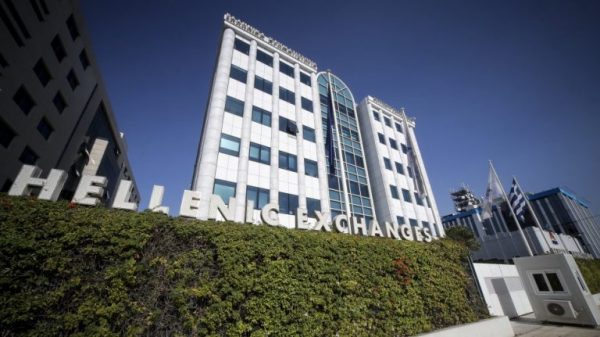
The European Commission’s autumn macroeconomic forecast for the Greek economy projects a 2.1% increase in Greece’s GDP for 2024, with a generally similar growth rate expected to be maintained in 2025 and 2026, supported by the implementation of the Recovery and Resilience Plan.
The report also highlights that the nominal deficit is expected to decrease from 1.3% of GDP in 2023 to 0.6% of GDP in 2024, reflecting an increase in the primary surplus from 2.1% of GDP in 2023 to 2.9% this year.
This reduction is largely attributed to the restrained increase in current expenditures and higher revenues from income taxes. By 2026, the reduction in public debt is expected to bring it close to 140% of GDP.
Unemployment, currently below 10%, is projected to continue its downward trend, albeit at a slower pace than in previous years. Inflation is forecast to be at 3.0% in 2024, gradually moderating to around 1.9% by 2026.
The Greek economy showed steady 2.1% year-on-year growth in the first half of 2024, driven mainly by domestic demand, while net exports acted as a drag on growth, according to the Commission’s estimates.
Following minimum wage rises, private consumption benefited from a relatively faster rise in wages for lower-income households, which are more prone to consumption. Equipment investment accelerated in parallel with a strong pickup in corporate credit growth, while a surge in imports accompanied by sluggish export growth prompted a decline in net exports.
Real GDP growth is expected to average 2.1% in 2024, largely due to strong domestic demand, according to the Commission’s forecast.
Looking ahead, private consumption is expected to continue growing at a strong pace, supported by steady increases in real incomes. Investments are projected to accelerate further, reaching a peak of nearly 9% in 2025, as the focus of the Recovery Fund shifts increasingly from reforms to investments and financing conditions improve.
The recovery of external demand is anticipated to boost export growth, further supported by past gains in cost competitiveness and structural reforms aimed at improving export performance.
Import growth is anticipated to remain strong, given the high import content of investments. Overall, GDP growth is set to remain above the long-term growth potential and is projected at 2.3% in 2025 and 2.2% in 2026, respectively.
According to the report, Greece’s employment rate increased to 54.9% (persons aged 15-74) in seasonally adjusted terms in the second quarter of 2024 but remains one of the lowest in the EU.
Although employment growth is set to continue, it will be at a slower pace as skills mismatches and structural bottlenecks, such as a lack of child- and elderly care solutions or the tight regulatory framework for part-time employment, limit the increase in labor supply.
However, the unemployment rate is anticipated to decline to around 9.0% by 2026, its lowest level in a decade.
Source: Tovima.com
Latest News

Alter Ego Ventures Invests in Pioneering Gaming Company ‘Couch Heroes’
Alter Ego Ventures' participation in the share capital of Couch Heroes marks yet another investment by the Alter Ego Media Group in innovative companies with a focus on technology.

Corruption Still Plagues Greece’s Driving Tests
While traffic accidents continue to claim lives on Greek roads daily, irregularities and under-the-table dealings in the training and testing of new drivers remain disturbingly widespread

Pope Francis Died of Stroke and Heart Failure Vatican Confirms
As news of the official cause of death spread, tributes poured in from across the globe. The 1.4 billion-member Catholic Church is united in grief, remembering a pope who championed inclusion, justice, and compassion

Increase in Both Museum Visits, Revenues for 2024
As expected, the Acropolis was the top archeological site in the country, followed by Sounion, Mycenae, the ancient theater of Epidaurus, and Vergina in northern Greece

Where Greece’s Tourists Come From: A Look at 2025’s Top Visitor Markets
The United Kingdom continues to hold the top spot as the largest source of incoming tourism, with 5.6 million seats booked for Greece this summer — up 2.2% from last year. This accounts for 20% of all international air traffic to Greece

Pope Francis: A Pontiff Who Reshaped the Papacy and Sparked a Global Conversation
His first words from the balcony of St. Peter’s Basilica—“Brothers and sisters, good evening”—set the tone for a pontificate that would challenge norms, favor mercy over dogma, and bring the papacy closer to the people.

When Blue Skies was Unmasked as ND’s Political ‘Slush Fund’
The fact that so many top New Democracy (ND) party cadres were paid by the firm Blue Skies, owned by Thomas Varvitsiotis and Yiannis Olympios, without ever citing this publicly, raises very serious moral issues, regardless of the legality

Greek Women’s Water Polo Team Top in the World after 13-9 Win Over Hungary
The Greek team had previously defeated another tournament favorite, the Netherlands, to reach the final.

S&P Raises Greek Rating; BBB with Stable Outlook
S&P’s decision raises the Greek economy to the second notch of investment grade ladder, at BBB with a stable outlook.

Greek Tourism Optimistic About Demand from American Market
A recent survey by MMGY Global, conducted from April 3–5 with a sample of 1,000 U.S. adults, found that 83% of Americans still intend to take leisure trips over the next 12 months, a slight drop from 87% in late February











![Πλημμύρες: Σημειώθηκαν σε επίπεδα ρεκόρ στην Ευρώπη το 2024 [γράφημα]](https://www.ot.gr/wp-content/uploads/2025/04/FLOOD_HUNGRY-90x90.jpg)


![Ξενοδοχεία: Μεγάλο το ενδιαφέρον για επενδύσεις στην Ελλάδα – Η θέση της Αθήνας [γραφήματα]](https://www.ot.gr/wp-content/uploads/2025/03/Athens-hotels-90x90.jpg)


![Airbnb: Πτωτικά κινήθηκε η ζήτηση τον Μάρτιο – Τι δείχνουν τα στοιχεία [γράφημα]](https://www.ot.gr/wp-content/uploads/2024/07/airbnb-gba8e58468_1280-1-90x90.jpg)
























 Αριθμός Πιστοποίησης
Αριθμός Πιστοποίησης